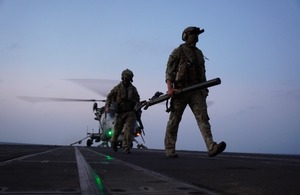
Royal Marines have struck another major victory against drug traffickers in the Gulf of Oman, stopping a high-speed smuggling boat with a single, pinpoint shot.
During a tense operation, snipers from 42 Commando Royal Marines, flying aboard a Wildcat helicopter launched from HMS Lancaster, disabled a drugs boat speeding at over 40 knots. Their precision shot hit the vessel’s engine dead-on, forcing it to stop instantly.
The interception was part of a wider pursuit involving three suspicious skiffs carrying illegal narcotics. In total, the Royal Navy recovered more than 1.5 tonnes of heroin, crystal meth, and hashish, worth over £35 million on UK streets.
This marks one of the most dramatic anti-drug operations the Royal Navy has conducted in the Middle East — and the first time snipers have used non-lethal disabling fire in the region, a tactic proven successful in the Caribbean.
“Excellence at work”
Minister for the Armed Forces, Al Carns, said: “Outstanding work by the crew of the HMS Lancaster who stopped and seized £35M worth of dangerous and illicit drugs at sea. Moreover, a well-planned operation culminating in a surgical shot by a Royal Marines sniper disabling the engine of a vessel traveling at 40 knots. That’s excellence at work.
Not only have our Royal Navy and Royal Marines disrupted a major criminal enterprise and kept drugs off our streets and away from our kids, but have once again demonstrated effectiveness, decisive action and the exceptionally high standard of our Royal Navy and Marines.
I salute our Royal Navy and Royal Marines for their indefatigable work keeping us safe at home and strong abroad”.
How the operation unfolded
The drama began at dawn when HMS Lancaster launched her Wildcat helicopter from 815 Naval Air Squadron for a routine patrol over the Gulf of Oman.
The crew soon spotted three fast-moving skiffs behaving suspiciously. Without alerting them, the Wildcat’s team shadowed the boats while relaying vital intelligence back to Lancaster.
Moments later, the ship launched its Peregrine mini-drone, which continued to track the skiffs covertly, streaming live video to the operations room.
When the Wildcat returned — this time carrying a Maritime Sniper Team from 42 Commando — the smugglers realized they had been found. They accelerated to over 40 knots and began dumping cargo into the sea to lighten their load.
Two of the skiffs were abandoned, but one continued to flee until the Royal Marines took aim and disabled its engine with a single shot. The Royal Navy’s sea boats then moved in to recover the floating packages and secure the scene.
Precision, patience, and professionalism
Commander Sam Stephens, Commanding Officer of HMS Lancaster said: “I’m hugely proud of the team’s professionalism, patience, and skill throughout what was a protracted chase,
This operation saw Lancaster’s crewed and uncrewed aircraft working hand-in-glove under the direction of the ship’s operations room. The outcome was a highly-successful bust, removing large quantities of narcotics from the streets and preventing their profits from fuelling extremism”.
Wildcat pilot Lieutenant Guy Warry added: “Non-lethal disabling fire has not been seen in the region and was essential in preventing the drug runners from moving their product.
Being the Wildcat pilot carrying out a live weapons firing on drug-running skiffs whilst flying backwards to provide a stable platform for the snipers was definitely a career highlight.
This interdiction is a true testament to the high levels of training that both the flight, MST and ship have achieved prior to the bust”.
A continuing mission
HMS Lancaster — a Type 23 frigate — is currently deployed on a long-term mission in the Middle East to help ensure regional security and stability.
This latest seizure follows another major bust in May, when the ship intercepted a £30 million drug shipment.
As part of the UK Government’s Plan for Change and Safer Streets Mission, the Royal Navy’s work at home and abroad remains vital to protecting national security. The Government has reaffirmed its commitment to the Armed Forces, pledging to increase defence spending to 2.6% of GDP by 2027, with an aim to reach 3% in the next Parliament.




































